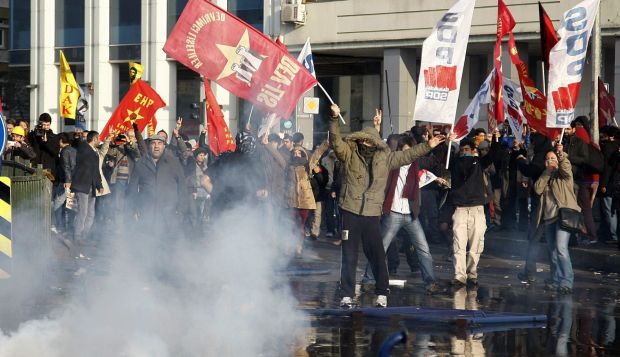
Turkish riot police use tear gas to disperse protestors during an anti government demonstration in Istanbul, Turkey, December 22, 2013. (EPA/Ulas Yunus Tosun)
London, Asharq Al-Awsat—Leading members of the US-based cleric Fethullah Gülen’s group fear reprisals from Turkey’s Prime Minister Recep Tayyip Erdoğan following the anti-corruption campaign launched by Turkish police and public prosecutors.
In a telephone call to Asharq Al-Awsat, a senior member of the Gülen group warned against any attempts to “demonize” the group, which works in the media and education sectors. This follows information about the possibility of the group being banned in a government reprisal.
In his first public comments on the spat between the movement and the Erdoğan government, local media reported Fethullah Gülen as saying: “Those who call a Muslim a [member of a] gang, a network, a bandit…these are nothing but a reflection of shabby thoughts.”
While Gülen did not directly mention Erdoğan in his comments, he appeared to tacitly criticize the government’s stance and recent statements, urging members of his Hizmet movement not to retaliate to “this kind of worthlessness.”
A number of prominent members of Erdoğan’s close circle have been targeted in the anti-corruption media campaign, including government ministers. A whispering campaign has been growing against ministers in Erdoğan’s government, leaving him open to attack by association.
Journalist Ahmet Cek said the government had in its possession archives, documents, pictures and video footage, which if released, would hurt the group. Erdoğan is reportedly planning to use the judiciary to launch a lawsuit which would implicate many members of the group.
Meanwhile, rumors began to surface over the silence of President Abdullah Gül on the current conflict between the government and the opposition in relation to corruption and calls for Erdoğan to resign. Observers said the reason for Gül’s lack of comment was his desire to distance himself from the conflict between Erdoğan and Gülen.
A source within the Turkish presidency, speaking to Asharq Al-Awsat on the condition of anonymity, said that the country should not expect Gül to comment on the current events because they involved judicial proceedings, adding that the president would not make any comment until a ruling has been issued.
The source dismissed the possibility of the president calling in the State Regulator—who only gets involved under presidential orders in specific situations—because the case was in the hands of the Turkish judiciary.
Meanwhile, the Turkish government continued its ousting of Gülen supporters within the police force. On Monday, 14 more police officers were dismissed in the Antalya governorate, while the government announced a decision which banned state employees, especially police, from carrying out investigations, or monitoring anyone, without informing their superiors. It also announced a decision to ban journalists from entering any security offices affiliated to the interior ministry.
In a related issue, media leaks continued regarding the involvement of government officials in corrupt practices. A TV channel announced it was in possession of a video recording showing relatives of other ministers admitting paying bribes, including Erdoğan’s advisers, Suad Clej and Yalçın Doğan.
The content of the video, which was filmed secretly, could not be broadcast because it was filmed illegally, but the channel reported that a relative of one of Erdoğan’s advisers had admitted paying 50,000 US dollars (100,000 Turkish lira) to bureaucrats working in the Health Ministry.

Let Erdoğan government accept the responsibility of its cadres and give them a punishment that suits them instead of hurting his country by victimizing innocent citizens because they are patriotic and helping his government to be a government of ethics and integrity.
Punishing people who believe in Gulens movement itself as if they are not citizens of Turkey, who have a right to save its citizens, sends a bad message of supporting corruption. These police men should be rewarded instead of being chased and be announced as heroes of Turkey.
Let Erdoğan work with these heroes(police men associated with Gunel movement) to free his government from corruption.